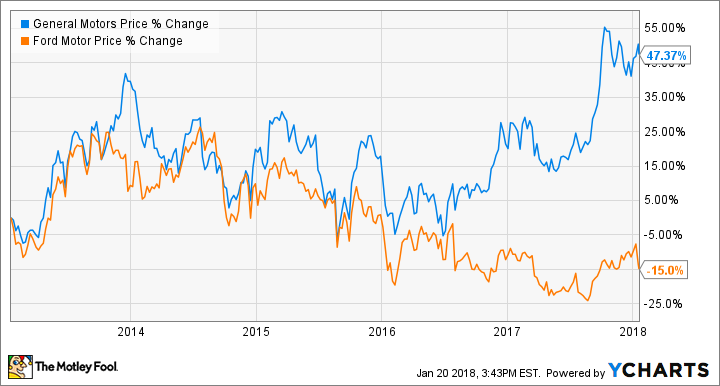General Motors Still Gets No Respect From Investors
Last week, General Motors (NYSE: GM) told investors that its 2017 earnings per share would come in near the high end of its guidance range. The company also shared a strong outlook for 2018 -- with the hint that results could get even better in 2019.
Ford Motor (NYSE: F) hasn't kept pace with its crosstown rival. It reported disappointing preliminary earnings results for the fourth quarter and projected that EPS may decline significantly in 2018. These continuing problems at Ford seem to be holding back General Motors stock -- undermining investors' confidence that GM's earnings strength is sustainable.
A tale of two automakers
Over the past five years or so, General Motors has sped up its product development cycle, with a focus on the most popular and profitable segments of the market. This approach has helped it stay relevant with consumers as tastes have changed.
For example, GM has broadened its crossover lineup and continues to do so, introducing small crossovers as an affordable alternative to compact and midsize cars, which have fallen out of favor. Last year, combined deliveries of the Buick Encore and Chevy Trax surpassed 167,000 units in the U.S., rivaling Chevy's high-volume car models. Similarly, GM reintroduced its Chevy Colorado and GMC Canyon midsize pickups a few years ago, following a brief hiatus. Combined U.S. deliveries of those two models exceeded 145,000 units in both 2016 and 2017.

The Chevy Colorado midsize pickup has been a big hit for GM. Image source: General Motors.
By contrast, Ford has been slow to respond to changing demand trends. Its flagship F-Series trucks remain extremely successful -- with sales approaching record levels -- but it doesn't have a big enough portfolio of crossovers and SUVs to offset plunging sales of compact and midsize cars.
Furthermore, Ford is way behind General Motors in China. In 2017, GM delivered more than 4 million vehicles there -- up 4.4% year over year -- and its operating margin remained quite strong despite pricing pressure in the market. Meanwhile, Ford's vehicle deliveries in China fell last year, slipping below 1.2 million.
The two automakers' recent earnings trajectories highlight their divergent fortunes. In its recent investor presentation, Ford estimated that adjusted EPS reached $1.78 in 2017 and will fall to $1.45-$1.70 in 2018, down from $1.93 in 2015. Pre-tax profit has fallen at an even faster rate. Yet GM has increased adjusted EPS from $5.02 in 2015 to around $6.50 in 2017. It expects its 2018 results to be "consistent" with the past year's performance.
Investors still don't believe in GM's success
Up until mid-2016, shares of General Motors and Ford tended to move in lockstep. Since then, GM stock has soared by about 50%, while Ford shares have continued to trend lower.
General Motors vs. Ford Motor Company Stock Performance, data by YCharts.
That said, Ford stock still carries a higher earnings multiple than GM stock: roughly 7.6 times forward earnings, versus 6.6, respectively. This difference is particularly surprising because Ford is years behind GM on multiple fronts, including SUV/crossover offerings, electric vehicles, and autonomous vehicles.
Indeed, General Motors expects 2019 to be an even better year than 2017 and 2018. By then, it will profit from a brand-new lineup of full-size trucks, which are set to hit the market later this year. New crossover models should also help boost earnings, particularly for the Cadillac brand. Lastly, GM will start to reap the benefits of a new shared vehicle architecture for emerging markets during 2019.
The General faces challenges -- but nothing it can't handle
Considering the company's outlook for strong profit growth in 2019, it's remarkable that GM stock trades for less than 7 times earnings. That's less than half of the market's average earnings multiple.
Of course, General Motors faces risks. Auto manufacturing is a cyclical industry, so at some point, GM's earnings momentum will end. On the other hand, U.S. auto sales already peaked in 2016. Based on GM's continued strong profitability, it appears that industry profits aren't nearly as cyclical as they were prior to the Great Recession.
The potential renegotiation of NAFTA could also hurt GM, which has a sizable manufacturing base in Mexico. However, even in a worst-case scenario, General Motors has the flexibility to move more manufacturing to the U.S. over the next few years. Assembly costs are a relatively small part of the total cost of building vehicles.
These risks aren't enough to justify General Motors' rock-bottom valuation. If 2018 and 2019 are as good to the company as management expects, GM stock has plenty of room to keep rising.
More From The Motley Fool
Adam Levine-Weinberg owns shares of General Motors. The Motley Fool owns shares of and recommends Ford. The Motley Fool has a disclosure policy.

